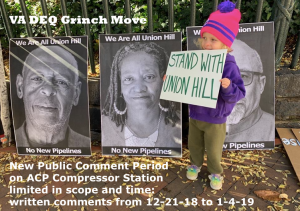From an Article by Vivian Thomson, Virginia Mercury, January 9, 2020
On January 7, 2019, I posed the following question about the Atlantic Coast Pipeline compressor station proposed for Union Hill: “Is an African-American community in rural Virginia the right place to put a massive compressor station for a natural gas pipeline? This is the question the Virginia Air Pollution Control Board will consider at its meeting Tuesday.”
On Tuesday, exactly a year later, the U.S. Court of Appeals for the 4th Circuit vacated the air board’s decision to approve a permit for the compressor station, concluding that the board and the State Department of Environmental Quality failed to consider “whether this facility is suitable for this site.” The court also found “arbitrary and capricious and unsupported by substantial evidence” DEQ’s refusal to consider as Best Available Control Technology an electric turbine, which would not emit on-site air pollution.
I argued last January that Gov. Northam should pressure Dominion Energy, the lead partner in the Atlantic Coast Pipeline consortium, to find another site for the station, or that the governor should work with the General Assembly to that end. Several weeks earlier, in November 2018, the governor had abruptly ended the tenure of two air board members who were opposed to the compressor station. In sending this unmistakable message to the board, Governor Northam sided with Dominion Energy, even before all the facts were in.
Here are some of the facts that, as far as I know, the air board never saw. Researchers have not identified a safe threshold for exposure to fine particulate matter, which increases the risk of death at levels below the EPA’s standards. Each additional microgram per cubic meter of airborne fine particulate matter, measured as an annual average, causes an estimated 0.6 to 1 percent increase in mortality. Dominion Energy’s modeling showed that the compressor station’s pollution could add 1.5 micrograms per cubic meter of fine particulate matter to local annual average levels of fine particulate matter. Buckingham County already shows a lower life expectancy than the statewide average.
Scientists have connected cardiovascular and respiratory disease with exposure to fine particulate matter concentrations similar to those estimated in Dominion’s air-quality modeling. African Americans are among the most vulnerable to the effects of fine particulate matter exposures.
The air board is made up of citizens appointed by the governor who work without pay to promote transparency via public debates and votes and to broaden the base of regulatory decision making. Those board members rely on DEQ’s staff and leaders to provide them with both a wide range of regulatory alternatives and also with insightful, complete analyses.
Clearly, DEQ failed the board on both counts. I wish I could say I was surprised. In 2008, when I was on the air board, two fellow board members suggested that the 1987 board statement on site suitability should be revised, to clarify the board’s powers with respect to site suitability. The board members’ ideas were rebuffed by senior officials in the administration of then-Gov. Tim Kaine, including DEQ managers.
As I set forth in my 2017 book, Climate of Capitulation: An Insider’s Account of State Power in a Coal Nation, Virginia suffers from a persistent tendency by elected politicians and DEQ’s management to yield to the regulated community’s preferences, whether those preferences are explicitly stated or merely anticipated. On two high profile power plant permits that the board considered during my tenure, DEQ staff and managers repeatedly failed to press companies to achieve the lowest emissions possible, within the constraints of the law and available technologies.
In the wake of the outrage about a racist photo discovered on his medical school year book page, Gov. Northam has professed his support for the state’s minorities. So, it’s time for our governor to walk the walk and not just talk the talk. The governor must ensure, either through pressure or legislation, that this compressor station is moved to a remote location well away from people and non-human organisms that might be adversely affected.
The air board must assert its right to have the full picture on best technologies. Since the 4th Circuit has now decided that the board’s legal obligation includes formally assessing the environmental justice implications of its decisions, the board must revise and take public comment on its 33-year-old site suitability policy, before making any other permit decisions.
And finally: It is long past time for new management at DEQ.
The dedicated staff at DEQ deserve to be led by someone who will take them to high ground and help them hold it.


